Professional Identity Formation in Healthcare
VerifiedAdded on 2021/02/22
|17
|4627
|47
AI Summary
This assignment delves into the topic of professional identity formation in various healthcare fields. It examines the importance of professional identity in medical education, social work, nursing, mental health nursing, and counseling. The assignment discusses how professional identity is shaped and sustained throughout a person's career and its implications for interprofessional practice and patient care. It also touches upon the role of educators in facilitating professional identity formation among students and professionals.
Contribute Materials
Your contribution can guide someone’s learning journey. Share your
documents today.
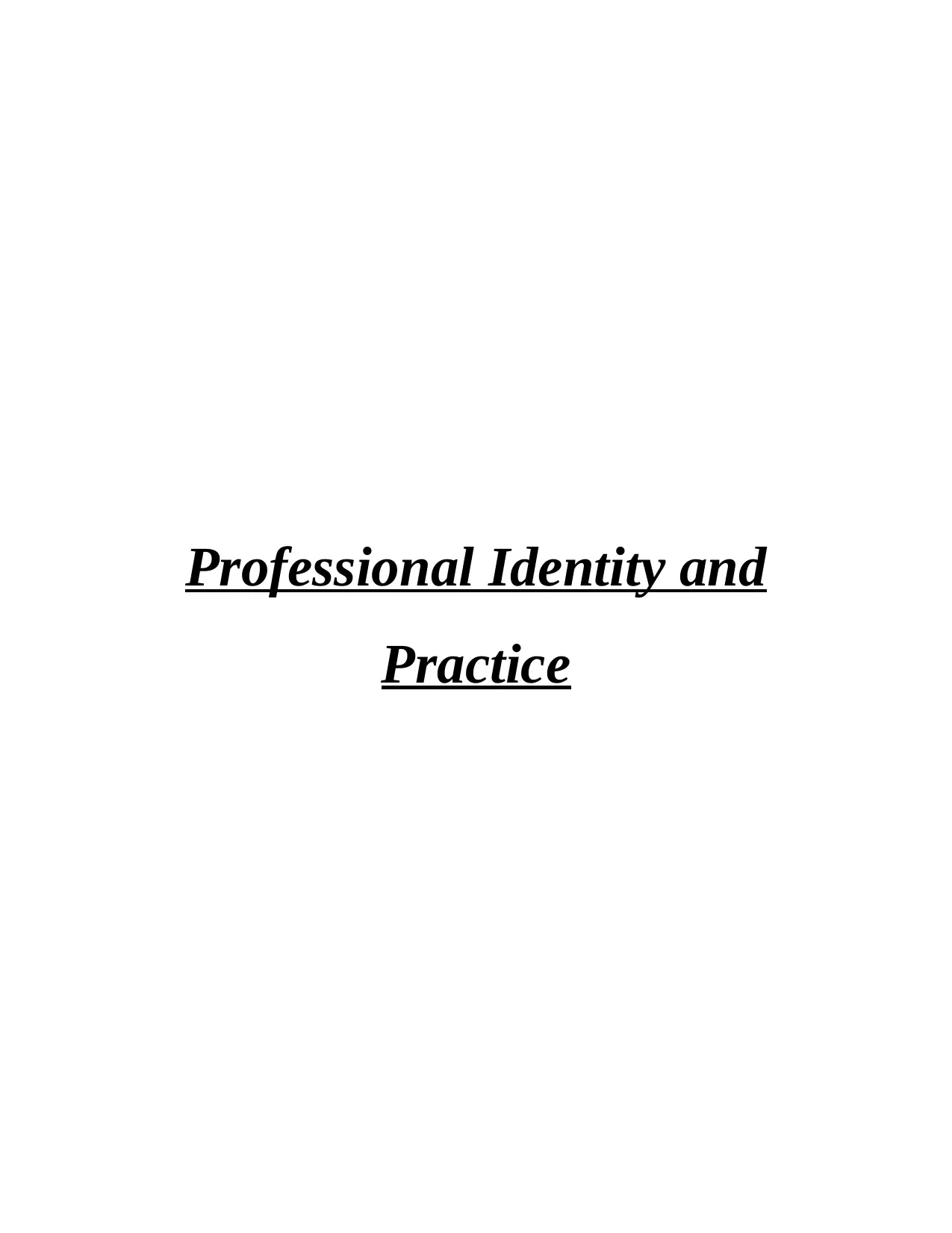
Professional Identity and
Practice
Practice
Secure Best Marks with AI Grader
Need help grading? Try our AI Grader for instant feedback on your assignments.

Table of Contents
INTRODUCTION...........................................................................................................................1
TASK 1............................................................................................................................................1
P1 Benefits of ongoing professional development for various stakeholders..............................1
P2 Expectation of professional employer of skills and competencies........................................2
TASK 2............................................................................................................................................4
P3 Assessing own abilities, skills and competences for specific job role...................................4
P4 Learning theories and approaches used for personal and professional development
processes.....................................................................................................................................6
TASK 3............................................................................................................................................7
P5 Professional development plan for enhancing skills and competencies................................7
TASK 4............................................................................................................................................8
P6 Job interview for service industry role...................................................................................8
P7 Strengths and weaknesses of applied interview process......................................................12
CONCLUSION..............................................................................................................................13
REFERENCES .............................................................................................................................14
.......................................................................................................................................................15
INTRODUCTION...........................................................................................................................1
TASK 1............................................................................................................................................1
P1 Benefits of ongoing professional development for various stakeholders..............................1
P2 Expectation of professional employer of skills and competencies........................................2
TASK 2............................................................................................................................................4
P3 Assessing own abilities, skills and competences for specific job role...................................4
P4 Learning theories and approaches used for personal and professional development
processes.....................................................................................................................................6
TASK 3............................................................................................................................................7
P5 Professional development plan for enhancing skills and competencies................................7
TASK 4............................................................................................................................................8
P6 Job interview for service industry role...................................................................................8
P7 Strengths and weaknesses of applied interview process......................................................12
CONCLUSION..............................................................................................................................13
REFERENCES .............................................................................................................................14
.......................................................................................................................................................15

INTRODUCTION
Professional identity is defined as individual's alliance of values, roles, ethical standards
and responsibilities which are accepted by particular profession (Albro, 2012). It is self based
idea that focus on values, experience, attributes, motives, values. This is very essential for
business to work in professional manner for achievement of goals and objectives. It is crucial for
professional to determine their skill and knowledge and perform accordingly. This report is
supported on Marriott Hotels and Resorts which was founded in 1957 at United States. It is large
hotel which render services worldwide in more than 566 locations. The job profile which is
selected for assignment is Food and Beverage Manager at Marriott Hotel. This report highlights
about benefits of ongoing professional development and expectation of employer for skills and
competence. In order to carry out own roles for given profile, abilities, skills and competence
should be assessed by individual with help of theories and approaches for personal and
professional development process. It also covers job interview process along with their strengths
and weaknesses.
TASK 1
P1 Benefits of ongoing professional development for various stakeholders
Continuing Professional Development (CPD) or ongoing professional development is
defined as learning activities which engage professionals in order to enhance and develop skills
and abilities. This helps in becoming learning more proactive than reactive and passive. It
combines various methodologies for learning like training, conference, workshops, events, best
practices techniques, e-learning programs for improvement and possess professional
development (CPD Explained, 2019). This can assist individual and profession to create value
and belief. Different category of people work in Marriott Hotel in order to serve users and
customers. For providing of effective service to them, ongoing professional development is
important so that goal can be achieved. The various benefits which stakeholders get through help
of ongoing professional development are discussed below:
Employee Benefits- They are individual who perform work and receives guideline and
help from superior for performance of task. The respective organisation conduct ongoing
professional development for their employee in order to improve them which provide benefits.
These are as follows:
1
Professional identity is defined as individual's alliance of values, roles, ethical standards
and responsibilities which are accepted by particular profession (Albro, 2012). It is self based
idea that focus on values, experience, attributes, motives, values. This is very essential for
business to work in professional manner for achievement of goals and objectives. It is crucial for
professional to determine their skill and knowledge and perform accordingly. This report is
supported on Marriott Hotels and Resorts which was founded in 1957 at United States. It is large
hotel which render services worldwide in more than 566 locations. The job profile which is
selected for assignment is Food and Beverage Manager at Marriott Hotel. This report highlights
about benefits of ongoing professional development and expectation of employer for skills and
competence. In order to carry out own roles for given profile, abilities, skills and competence
should be assessed by individual with help of theories and approaches for personal and
professional development process. It also covers job interview process along with their strengths
and weaknesses.
TASK 1
P1 Benefits of ongoing professional development for various stakeholders
Continuing Professional Development (CPD) or ongoing professional development is
defined as learning activities which engage professionals in order to enhance and develop skills
and abilities. This helps in becoming learning more proactive than reactive and passive. It
combines various methodologies for learning like training, conference, workshops, events, best
practices techniques, e-learning programs for improvement and possess professional
development (CPD Explained, 2019). This can assist individual and profession to create value
and belief. Different category of people work in Marriott Hotel in order to serve users and
customers. For providing of effective service to them, ongoing professional development is
important so that goal can be achieved. The various benefits which stakeholders get through help
of ongoing professional development are discussed below:
Employee Benefits- They are individual who perform work and receives guideline and
help from superior for performance of task. The respective organisation conduct ongoing
professional development for their employee in order to improve them which provide benefits.
These are as follows:
1

Added Value on CV and Future Employment- The ongoing professional development
provided by Marriott Hotels can help employee to add value on their CV which is plus
point for them to get good employment opportunities in future time period. Ownership of Role- With help of ongoing professional development employees of
Marriott Hotel can identify their own roles for work performance. This can help them to
determine their roles, duties and responsibilities in better and effective manner for
achievement of business results.
Personal Satisfaction- The employee working in hotel industry requires personal
satisfaction regarding their work and organisation which can be possible only by getting
ongoing professional development. This can lead in better work performance and
increase of productivity (Andrew, 2012).
Employer Benefits- They are regarded as manager, guider and helper for employees who
works in organisation. The individuals working in hospitality industry should receive guidance
from their superior for providing of good services. The benefits provided through ongoing
professional development to employer are: Skilled Workforce- It is very important for respective organisation to have skilled
working force. This can be possible if employer has learned ongoing professional
development from their firm in order to hire capable people.
Competitive Edge through Human Capital- There is huge competitive among hotel
industry. Marriott hotel can gain competitive edge by providing ongoing professional
development to their employer which can assist them to hire skilled and capable human
for their business. As employer are main performer for business who assist in
achievement of goal and objectives (Beltman and et. al., 2015).
P2 Expectation of professional employer of skills and competencies
In order to play role of given job profile, there are some expectation of employer with
their employee regarding skills and competence. These can be different from one another as each
individual has some unique skill and competence for work performance. The expectation of
professional employer regarding skills and competence of given job role are:
Professional Standards and Expectation- In order to be food and beverage manager,
the expectation regarding of employer are:
2
provided by Marriott Hotels can help employee to add value on their CV which is plus
point for them to get good employment opportunities in future time period. Ownership of Role- With help of ongoing professional development employees of
Marriott Hotel can identify their own roles for work performance. This can help them to
determine their roles, duties and responsibilities in better and effective manner for
achievement of business results.
Personal Satisfaction- The employee working in hotel industry requires personal
satisfaction regarding their work and organisation which can be possible only by getting
ongoing professional development. This can lead in better work performance and
increase of productivity (Andrew, 2012).
Employer Benefits- They are regarded as manager, guider and helper for employees who
works in organisation. The individuals working in hospitality industry should receive guidance
from their superior for providing of good services. The benefits provided through ongoing
professional development to employer are: Skilled Workforce- It is very important for respective organisation to have skilled
working force. This can be possible if employer has learned ongoing professional
development from their firm in order to hire capable people.
Competitive Edge through Human Capital- There is huge competitive among hotel
industry. Marriott hotel can gain competitive edge by providing ongoing professional
development to their employer which can assist them to hire skilled and capable human
for their business. As employer are main performer for business who assist in
achievement of goal and objectives (Beltman and et. al., 2015).
P2 Expectation of professional employer of skills and competencies
In order to play role of given job profile, there are some expectation of employer with
their employee regarding skills and competence. These can be different from one another as each
individual has some unique skill and competence for work performance. The expectation of
professional employer regarding skills and competence of given job role are:
Professional Standards and Expectation- In order to be food and beverage manager,
the expectation regarding of employer are:
2
Secure Best Marks with AI Grader
Need help grading? Try our AI Grader for instant feedback on your assignments.
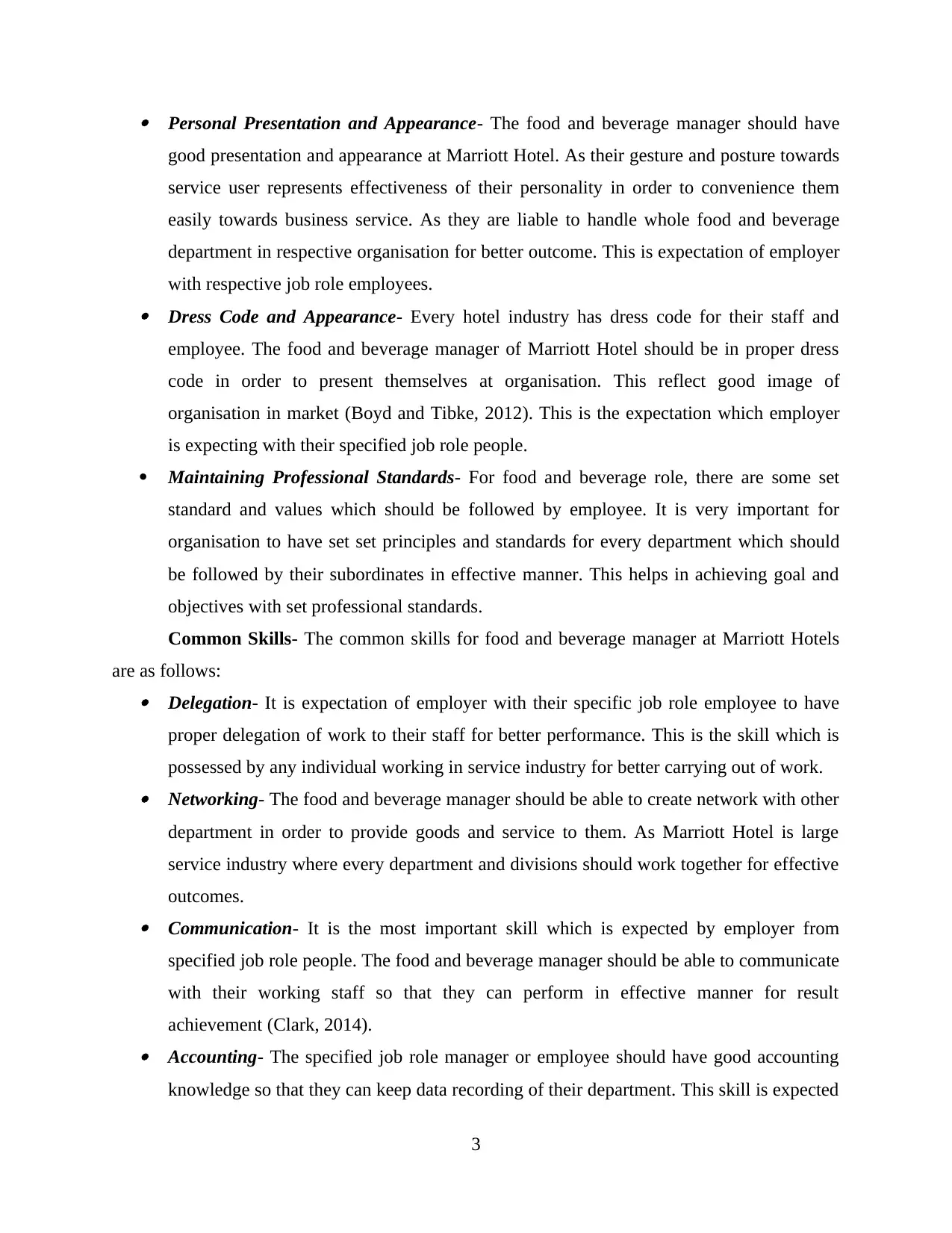
Personal Presentation and Appearance- The food and beverage manager should have
good presentation and appearance at Marriott Hotel. As their gesture and posture towards
service user represents effectiveness of their personality in order to convenience them
easily towards business service. As they are liable to handle whole food and beverage
department in respective organisation for better outcome. This is expectation of employer
with respective job role employees. Dress Code and Appearance- Every hotel industry has dress code for their staff and
employee. The food and beverage manager of Marriott Hotel should be in proper dress
code in order to present themselves at organisation. This reflect good image of
organisation in market (Boyd and Tibke, 2012). This is the expectation which employer
is expecting with their specified job role people.
Maintaining Professional Standards- For food and beverage role, there are some set
standard and values which should be followed by employee. It is very important for
organisation to have set set principles and standards for every department which should
be followed by their subordinates in effective manner. This helps in achieving goal and
objectives with set professional standards.
Common Skills- The common skills for food and beverage manager at Marriott Hotels
are as follows: Delegation- It is expectation of employer with their specific job role employee to have
proper delegation of work to their staff for better performance. This is the skill which is
possessed by any individual working in service industry for better carrying out of work. Networking- The food and beverage manager should be able to create network with other
department in order to provide goods and service to them. As Marriott Hotel is large
service industry where every department and divisions should work together for effective
outcomes. Communication- It is the most important skill which is expected by employer from
specified job role people. The food and beverage manager should be able to communicate
with their working staff so that they can perform in effective manner for result
achievement (Clark, 2014). Accounting- The specified job role manager or employee should have good accounting
knowledge so that they can keep data recording of their department. This skill is expected
3
good presentation and appearance at Marriott Hotel. As their gesture and posture towards
service user represents effectiveness of their personality in order to convenience them
easily towards business service. As they are liable to handle whole food and beverage
department in respective organisation for better outcome. This is expectation of employer
with respective job role employees. Dress Code and Appearance- Every hotel industry has dress code for their staff and
employee. The food and beverage manager of Marriott Hotel should be in proper dress
code in order to present themselves at organisation. This reflect good image of
organisation in market (Boyd and Tibke, 2012). This is the expectation which employer
is expecting with their specified job role people.
Maintaining Professional Standards- For food and beverage role, there are some set
standard and values which should be followed by employee. It is very important for
organisation to have set set principles and standards for every department which should
be followed by their subordinates in effective manner. This helps in achieving goal and
objectives with set professional standards.
Common Skills- The common skills for food and beverage manager at Marriott Hotels
are as follows: Delegation- It is expectation of employer with their specific job role employee to have
proper delegation of work to their staff for better performance. This is the skill which is
possessed by any individual working in service industry for better carrying out of work. Networking- The food and beverage manager should be able to create network with other
department in order to provide goods and service to them. As Marriott Hotel is large
service industry where every department and divisions should work together for effective
outcomes. Communication- It is the most important skill which is expected by employer from
specified job role people. The food and beverage manager should be able to communicate
with their working staff so that they can perform in effective manner for result
achievement (Clark, 2014). Accounting- The specified job role manager or employee should have good accounting
knowledge so that they can keep data recording of their department. This skill is expected
3
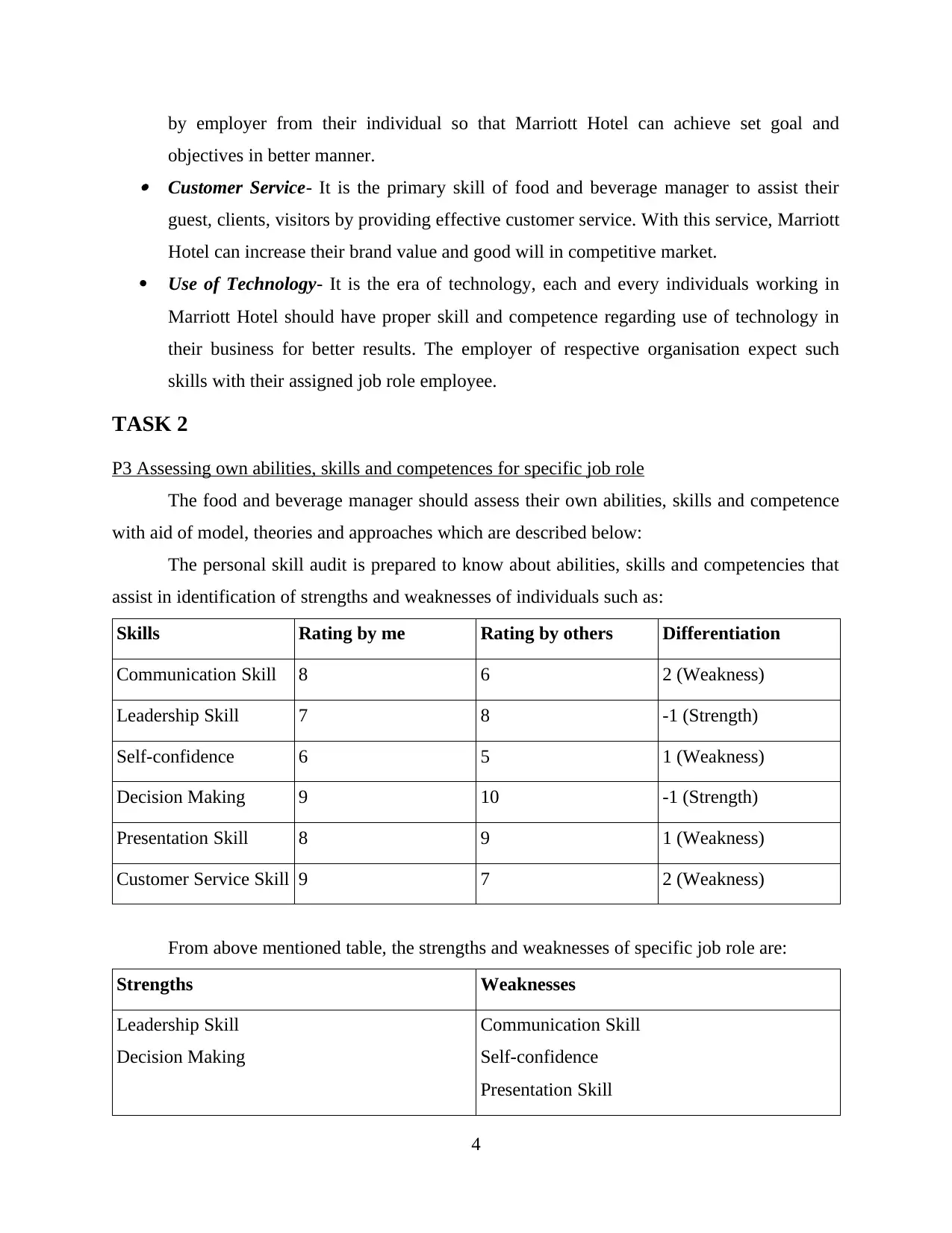
by employer from their individual so that Marriott Hotel can achieve set goal and
objectives in better manner. Customer Service- It is the primary skill of food and beverage manager to assist their
guest, clients, visitors by providing effective customer service. With this service, Marriott
Hotel can increase their brand value and good will in competitive market.
Use of Technology- It is the era of technology, each and every individuals working in
Marriott Hotel should have proper skill and competence regarding use of technology in
their business for better results. The employer of respective organisation expect such
skills with their assigned job role employee.
TASK 2
P3 Assessing own abilities, skills and competences for specific job role
The food and beverage manager should assess their own abilities, skills and competence
with aid of model, theories and approaches which are described below:
The personal skill audit is prepared to know about abilities, skills and competencies that
assist in identification of strengths and weaknesses of individuals such as:
Skills Rating by me Rating by others Differentiation
Communication Skill 8 6 2 (Weakness)
Leadership Skill 7 8 -1 (Strength)
Self-confidence 6 5 1 (Weakness)
Decision Making 9 10 -1 (Strength)
Presentation Skill 8 9 1 (Weakness)
Customer Service Skill 9 7 2 (Weakness)
From above mentioned table, the strengths and weaknesses of specific job role are:
Strengths Weaknesses
Leadership Skill
Decision Making
Communication Skill
Self-confidence
Presentation Skill
4
objectives in better manner. Customer Service- It is the primary skill of food and beverage manager to assist their
guest, clients, visitors by providing effective customer service. With this service, Marriott
Hotel can increase their brand value and good will in competitive market.
Use of Technology- It is the era of technology, each and every individuals working in
Marriott Hotel should have proper skill and competence regarding use of technology in
their business for better results. The employer of respective organisation expect such
skills with their assigned job role employee.
TASK 2
P3 Assessing own abilities, skills and competences for specific job role
The food and beverage manager should assess their own abilities, skills and competence
with aid of model, theories and approaches which are described below:
The personal skill audit is prepared to know about abilities, skills and competencies that
assist in identification of strengths and weaknesses of individuals such as:
Skills Rating by me Rating by others Differentiation
Communication Skill 8 6 2 (Weakness)
Leadership Skill 7 8 -1 (Strength)
Self-confidence 6 5 1 (Weakness)
Decision Making 9 10 -1 (Strength)
Presentation Skill 8 9 1 (Weakness)
Customer Service Skill 9 7 2 (Weakness)
From above mentioned table, the strengths and weaknesses of specific job role are:
Strengths Weaknesses
Leadership Skill
Decision Making
Communication Skill
Self-confidence
Presentation Skill
4
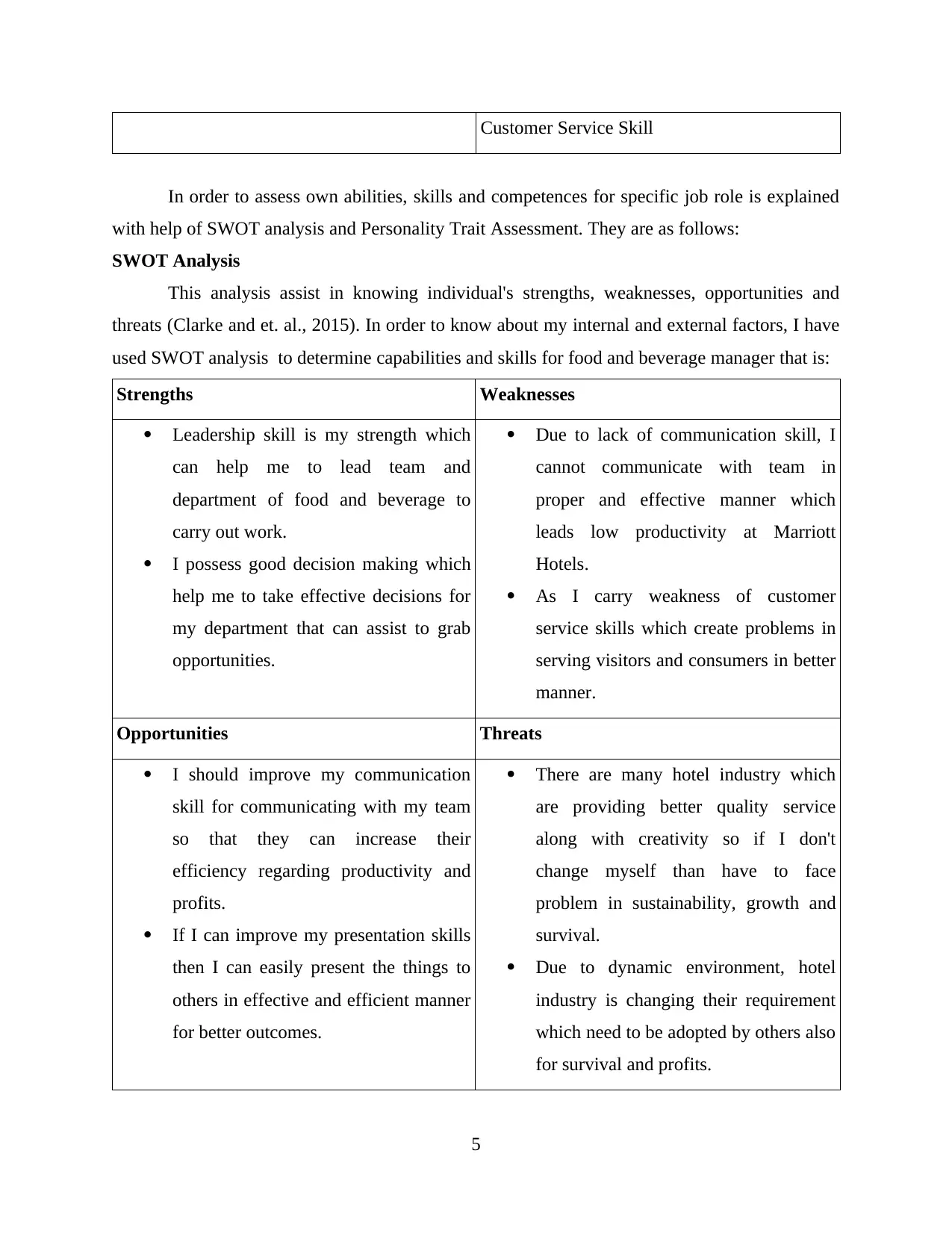
Customer Service Skill
In order to assess own abilities, skills and competences for specific job role is explained
with help of SWOT analysis and Personality Trait Assessment. They are as follows:
SWOT Analysis
This analysis assist in knowing individual's strengths, weaknesses, opportunities and
threats (Clarke and et. al., 2015). In order to know about my internal and external factors, I have
used SWOT analysis to determine capabilities and skills for food and beverage manager that is:
Strengths Weaknesses
Leadership skill is my strength which
can help me to lead team and
department of food and beverage to
carry out work.
I possess good decision making which
help me to take effective decisions for
my department that can assist to grab
opportunities.
Due to lack of communication skill, I
cannot communicate with team in
proper and effective manner which
leads low productivity at Marriott
Hotels.
As I carry weakness of customer
service skills which create problems in
serving visitors and consumers in better
manner.
Opportunities Threats
I should improve my communication
skill for communicating with my team
so that they can increase their
efficiency regarding productivity and
profits.
If I can improve my presentation skills
then I can easily present the things to
others in effective and efficient manner
for better outcomes.
There are many hotel industry which
are providing better quality service
along with creativity so if I don't
change myself than have to face
problem in sustainability, growth and
survival.
Due to dynamic environment, hotel
industry is changing their requirement
which need to be adopted by others also
for survival and profits.
5
In order to assess own abilities, skills and competences for specific job role is explained
with help of SWOT analysis and Personality Trait Assessment. They are as follows:
SWOT Analysis
This analysis assist in knowing individual's strengths, weaknesses, opportunities and
threats (Clarke and et. al., 2015). In order to know about my internal and external factors, I have
used SWOT analysis to determine capabilities and skills for food and beverage manager that is:
Strengths Weaknesses
Leadership skill is my strength which
can help me to lead team and
department of food and beverage to
carry out work.
I possess good decision making which
help me to take effective decisions for
my department that can assist to grab
opportunities.
Due to lack of communication skill, I
cannot communicate with team in
proper and effective manner which
leads low productivity at Marriott
Hotels.
As I carry weakness of customer
service skills which create problems in
serving visitors and consumers in better
manner.
Opportunities Threats
I should improve my communication
skill for communicating with my team
so that they can increase their
efficiency regarding productivity and
profits.
If I can improve my presentation skills
then I can easily present the things to
others in effective and efficient manner
for better outcomes.
There are many hotel industry which
are providing better quality service
along with creativity so if I don't
change myself than have to face
problem in sustainability, growth and
survival.
Due to dynamic environment, hotel
industry is changing their requirement
which need to be adopted by others also
for survival and profits.
5
Paraphrase This Document
Need a fresh take? Get an instant paraphrase of this document with our AI Paraphraser

Personality Trait Assessment
There are five traits of person which are:
Openness- For working at Marriott Hotel as food and beverage manager, I should be
creative, focus on challenges, try new things and others (The Big Five Personality Traits, 2019).
Conscientiousness- I should be thoughtfulness, goal directed, spend time in preparing
things for making work effective and efficient manner at Marriott Hotel.
Extraversion- In order to play role of manager, I need to be excitable, talkative, social-
able so that I can make proper decisions for department at Marriott Hotel.
Agreeableness- I should possess characteristics such as kindness, affection, trust for
better work performance. This can help me to work in food and beverage department in effective
way.
Neucroticism- This traits reflects moodiness, sadness, emotional instability. This should
be low in order to be play role of food and beverage manager at Marriott Hotel. I am very moody
which can impact organisation in achieving their goals.
P4 Learning theories and approaches used for personal and professional development processes
The personal and professional development processes is defined as help for managing
learning and growth of career (Crigger and Godfrey, 2014). This can assist in performing work
in safely, ethically and effectively manner. The different learning theories and approaches used
for personal and professional development processes in Marriott Hotel are:
Learning Theories
The theory which is used for personal and professional development processes are:
Social Learning Theory- It is also called behaviourism development theory. This means
individual can learn by observing others through direct and indirect way. This theory can be used
by Marriott Hotel for their employee in order to develop their personal and professional
development. There are three phases of this theory, first is attention where employees of
respective organisation has to pay attention for improving themselves. Second is learning
through observation where subordinate observe superior for better work performance. Third is
analysis of subject and coding it for performing various role at hotel industry and improve
personal and professional development. This theory can help individual to learn from other
through face to face or interpersonal interaction. For example, manager of Marriott hotel possess
6
There are five traits of person which are:
Openness- For working at Marriott Hotel as food and beverage manager, I should be
creative, focus on challenges, try new things and others (The Big Five Personality Traits, 2019).
Conscientiousness- I should be thoughtfulness, goal directed, spend time in preparing
things for making work effective and efficient manner at Marriott Hotel.
Extraversion- In order to play role of manager, I need to be excitable, talkative, social-
able so that I can make proper decisions for department at Marriott Hotel.
Agreeableness- I should possess characteristics such as kindness, affection, trust for
better work performance. This can help me to work in food and beverage department in effective
way.
Neucroticism- This traits reflects moodiness, sadness, emotional instability. This should
be low in order to be play role of food and beverage manager at Marriott Hotel. I am very moody
which can impact organisation in achieving their goals.
P4 Learning theories and approaches used for personal and professional development processes
The personal and professional development processes is defined as help for managing
learning and growth of career (Crigger and Godfrey, 2014). This can assist in performing work
in safely, ethically and effectively manner. The different learning theories and approaches used
for personal and professional development processes in Marriott Hotel are:
Learning Theories
The theory which is used for personal and professional development processes are:
Social Learning Theory- It is also called behaviourism development theory. This means
individual can learn by observing others through direct and indirect way. This theory can be used
by Marriott Hotel for their employee in order to develop their personal and professional
development. There are three phases of this theory, first is attention where employees of
respective organisation has to pay attention for improving themselves. Second is learning
through observation where subordinate observe superior for better work performance. Third is
analysis of subject and coding it for performing various role at hotel industry and improve
personal and professional development. This theory can help individual to learn from other
through face to face or interpersonal interaction. For example, manager of Marriott hotel possess
6
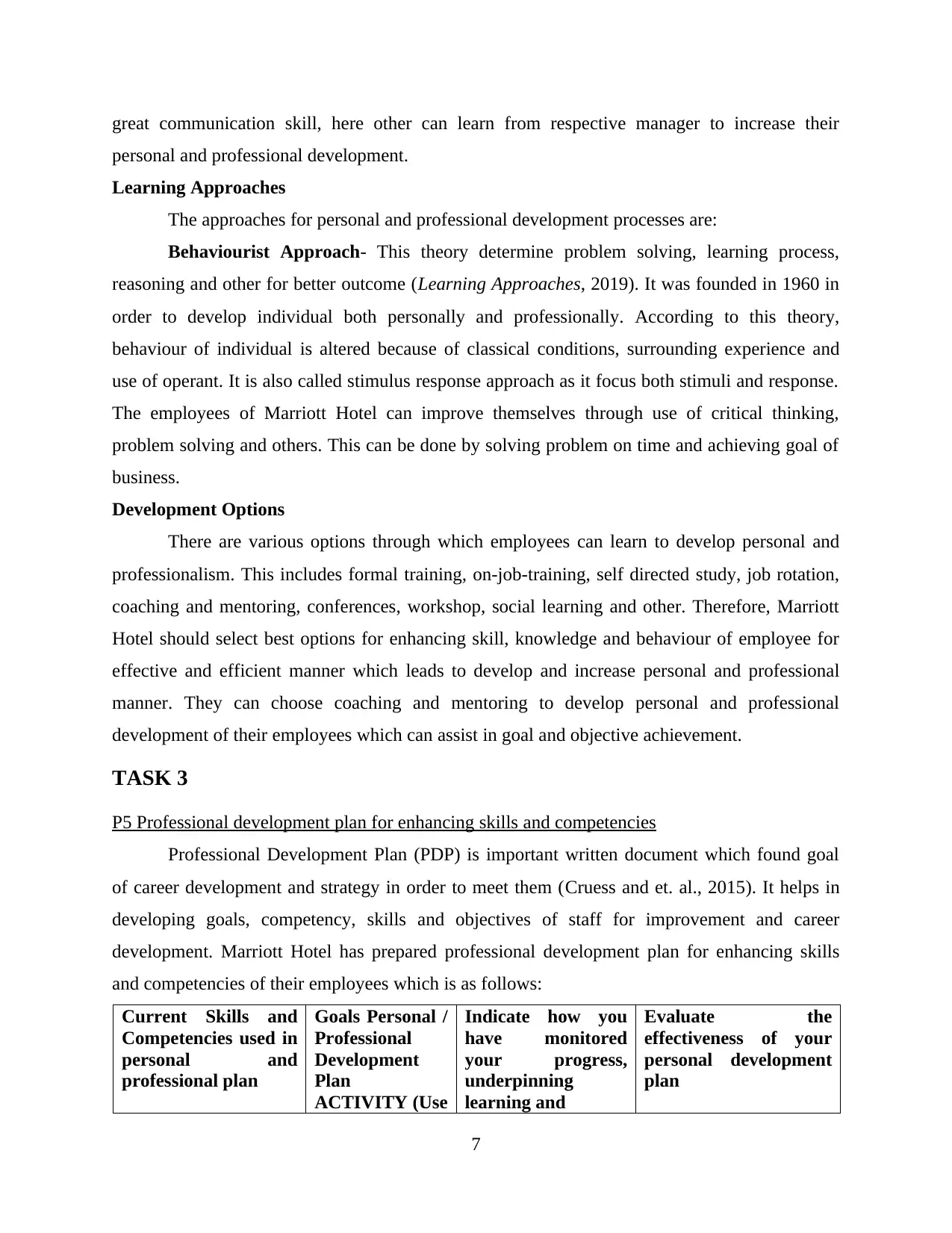
great communication skill, here other can learn from respective manager to increase their
personal and professional development.
Learning Approaches
The approaches for personal and professional development processes are:
Behaviourist Approach- This theory determine problem solving, learning process,
reasoning and other for better outcome (Learning Approaches, 2019). It was founded in 1960 in
order to develop individual both personally and professionally. According to this theory,
behaviour of individual is altered because of classical conditions, surrounding experience and
use of operant. It is also called stimulus response approach as it focus both stimuli and response.
The employees of Marriott Hotel can improve themselves through use of critical thinking,
problem solving and others. This can be done by solving problem on time and achieving goal of
business.
Development Options
There are various options through which employees can learn to develop personal and
professionalism. This includes formal training, on-job-training, self directed study, job rotation,
coaching and mentoring, conferences, workshop, social learning and other. Therefore, Marriott
Hotel should select best options for enhancing skill, knowledge and behaviour of employee for
effective and efficient manner which leads to develop and increase personal and professional
manner. They can choose coaching and mentoring to develop personal and professional
development of their employees which can assist in goal and objective achievement.
TASK 3
P5 Professional development plan for enhancing skills and competencies
Professional Development Plan (PDP) is important written document which found goal
of career development and strategy in order to meet them (Cruess and et. al., 2015). It helps in
developing goals, competency, skills and objectives of staff for improvement and career
development. Marriott Hotel has prepared professional development plan for enhancing skills
and competencies of their employees which is as follows:
Current Skills and
Competencies used in
personal and
professional plan
Goals Personal /
Professional
Development
Plan
ACTIVITY (Use
Indicate how you
have monitored
your progress,
underpinning
learning and
Evaluate the
effectiveness of your
personal development
plan
7
personal and professional development.
Learning Approaches
The approaches for personal and professional development processes are:
Behaviourist Approach- This theory determine problem solving, learning process,
reasoning and other for better outcome (Learning Approaches, 2019). It was founded in 1960 in
order to develop individual both personally and professionally. According to this theory,
behaviour of individual is altered because of classical conditions, surrounding experience and
use of operant. It is also called stimulus response approach as it focus both stimuli and response.
The employees of Marriott Hotel can improve themselves through use of critical thinking,
problem solving and others. This can be done by solving problem on time and achieving goal of
business.
Development Options
There are various options through which employees can learn to develop personal and
professionalism. This includes formal training, on-job-training, self directed study, job rotation,
coaching and mentoring, conferences, workshop, social learning and other. Therefore, Marriott
Hotel should select best options for enhancing skill, knowledge and behaviour of employee for
effective and efficient manner which leads to develop and increase personal and professional
manner. They can choose coaching and mentoring to develop personal and professional
development of their employees which can assist in goal and objective achievement.
TASK 3
P5 Professional development plan for enhancing skills and competencies
Professional Development Plan (PDP) is important written document which found goal
of career development and strategy in order to meet them (Cruess and et. al., 2015). It helps in
developing goals, competency, skills and objectives of staff for improvement and career
development. Marriott Hotel has prepared professional development plan for enhancing skills
and competencies of their employees which is as follows:
Current Skills and
Competencies used in
personal and
professional plan
Goals Personal /
Professional
Development
Plan
ACTIVITY (Use
Indicate how you
have monitored
your progress,
underpinning
learning and
Evaluate the
effectiveness of your
personal development
plan
7

SMART targets) development theory
Communication Skill Long Term Goals
(1 months)
VAK Learning: With
help of such theory I
can evaluate my
progress regarding
communication using
tool of theory.
Participation in different
program and taking class
for improvement. The
main purpose is to
improve skill and help
business in achievement
of goal.
Self-confidence Medium Term
Goals (6 months)
Behaviourist Theory:
The way I behave
with individual can
help me to evaluate
my own
performance.
This can be improve by
participating in public
speaking and purpose is
to take decision in
efficient manner.
Presentation Skill Short Term
Goals (3 months)
Benchmarking: I
should set time
period for improving
presentation skill and
evaluate it on end of
time period for
measuring progress.
For this training
presentation should be
taken so that business
can present what they
want to in front of
audience. The main
purpose is increase
present organisation in
competitive market with
help of skills.
Customer Service Skill Long Term Goals
(1Year)
Social Learning
Theory: This theory
helps in creating
social relationship
with other which can
help me to improve
my customer service
skill.
It is most important skill
which should be
possessed by staff for
providing services. It
main purpose is to
increase goodwill and
value of organisation
with help of skill.
The training courses undertaken has been taken in past year and recent are as follows:
Training Course
undertaken
Date Venue Main Learning undertaken/new
skills developed
Beverage Safety
Management
12th
December,
2018
Hilton Hotel Management of beverage
Requirement of different
beverage
Providing training and
development to staff.
Food Safety
Management
30th May,
2019
Radisson Blu Food Safety
Managing food hygiene protocols
8
Communication Skill Long Term Goals
(1 months)
VAK Learning: With
help of such theory I
can evaluate my
progress regarding
communication using
tool of theory.
Participation in different
program and taking class
for improvement. The
main purpose is to
improve skill and help
business in achievement
of goal.
Self-confidence Medium Term
Goals (6 months)
Behaviourist Theory:
The way I behave
with individual can
help me to evaluate
my own
performance.
This can be improve by
participating in public
speaking and purpose is
to take decision in
efficient manner.
Presentation Skill Short Term
Goals (3 months)
Benchmarking: I
should set time
period for improving
presentation skill and
evaluate it on end of
time period for
measuring progress.
For this training
presentation should be
taken so that business
can present what they
want to in front of
audience. The main
purpose is increase
present organisation in
competitive market with
help of skills.
Customer Service Skill Long Term Goals
(1Year)
Social Learning
Theory: This theory
helps in creating
social relationship
with other which can
help me to improve
my customer service
skill.
It is most important skill
which should be
possessed by staff for
providing services. It
main purpose is to
increase goodwill and
value of organisation
with help of skill.
The training courses undertaken has been taken in past year and recent are as follows:
Training Course
undertaken
Date Venue Main Learning undertaken/new
skills developed
Beverage Safety
Management
12th
December,
2018
Hilton Hotel Management of beverage
Requirement of different
beverage
Providing training and
development to staff.
Food Safety
Management
30th May,
2019
Radisson Blu Food Safety
Managing food hygiene protocols
8
Secure Best Marks with AI Grader
Need help grading? Try our AI Grader for instant feedback on your assignments.
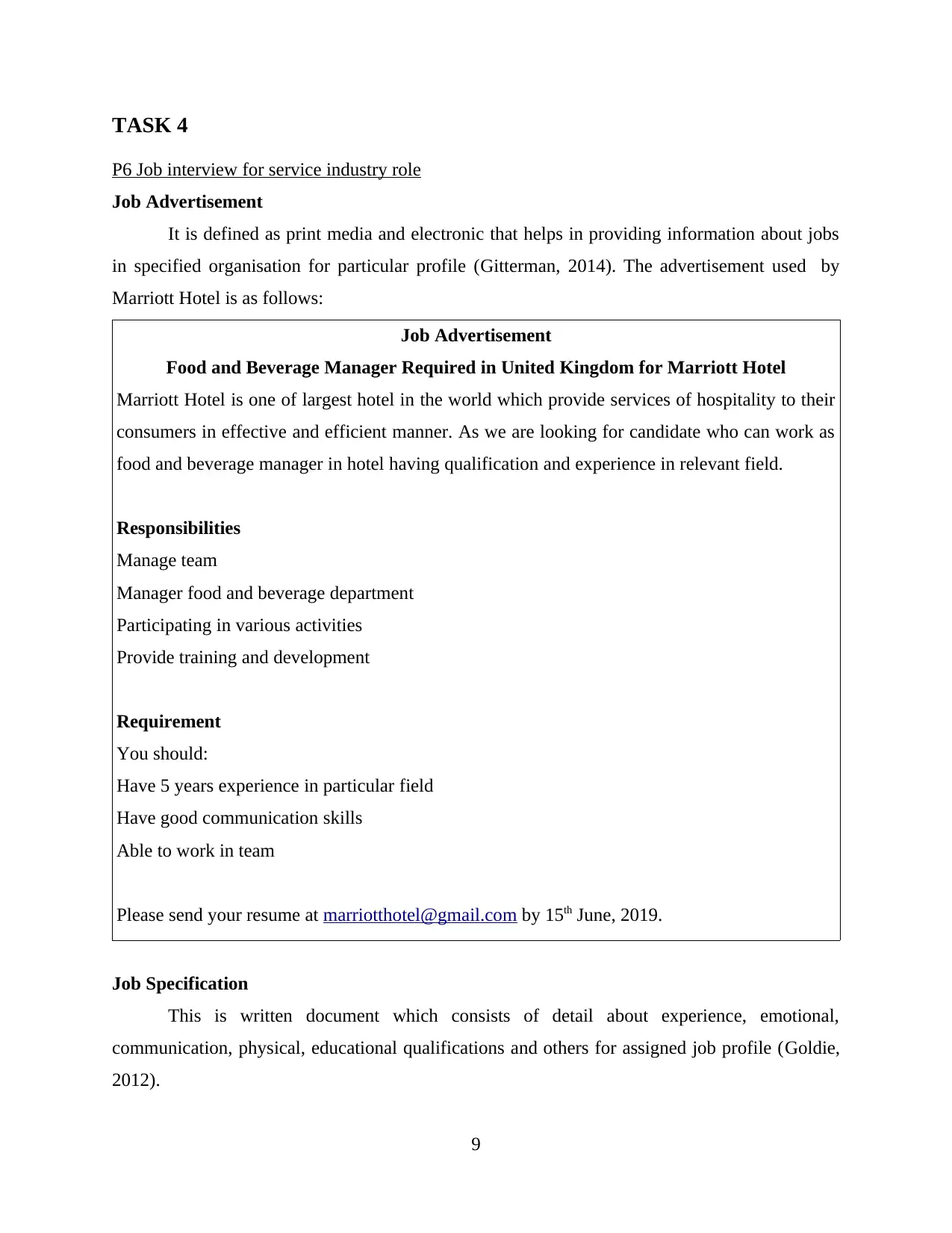
TASK 4
P6 Job interview for service industry role
Job Advertisement
It is defined as print media and electronic that helps in providing information about jobs
in specified organisation for particular profile (Gitterman, 2014). The advertisement used by
Marriott Hotel is as follows:
Job Advertisement
Food and Beverage Manager Required in United Kingdom for Marriott Hotel
Marriott Hotel is one of largest hotel in the world which provide services of hospitality to their
consumers in effective and efficient manner. As we are looking for candidate who can work as
food and beverage manager in hotel having qualification and experience in relevant field.
Responsibilities
Manage team
Manager food and beverage department
Participating in various activities
Provide training and development
Requirement
You should:
Have 5 years experience in particular field
Have good communication skills
Able to work in team
Please send your resume at marriotthotel@gmail.com by 15th June, 2019.
Job Specification
This is written document which consists of detail about experience, emotional,
communication, physical, educational qualifications and others for assigned job profile (Goldie,
2012).
9
P6 Job interview for service industry role
Job Advertisement
It is defined as print media and electronic that helps in providing information about jobs
in specified organisation for particular profile (Gitterman, 2014). The advertisement used by
Marriott Hotel is as follows:
Job Advertisement
Food and Beverage Manager Required in United Kingdom for Marriott Hotel
Marriott Hotel is one of largest hotel in the world which provide services of hospitality to their
consumers in effective and efficient manner. As we are looking for candidate who can work as
food and beverage manager in hotel having qualification and experience in relevant field.
Responsibilities
Manage team
Manager food and beverage department
Participating in various activities
Provide training and development
Requirement
You should:
Have 5 years experience in particular field
Have good communication skills
Able to work in team
Please send your resume at marriotthotel@gmail.com by 15th June, 2019.
Job Specification
This is written document which consists of detail about experience, emotional,
communication, physical, educational qualifications and others for assigned job profile (Goldie,
2012).
9
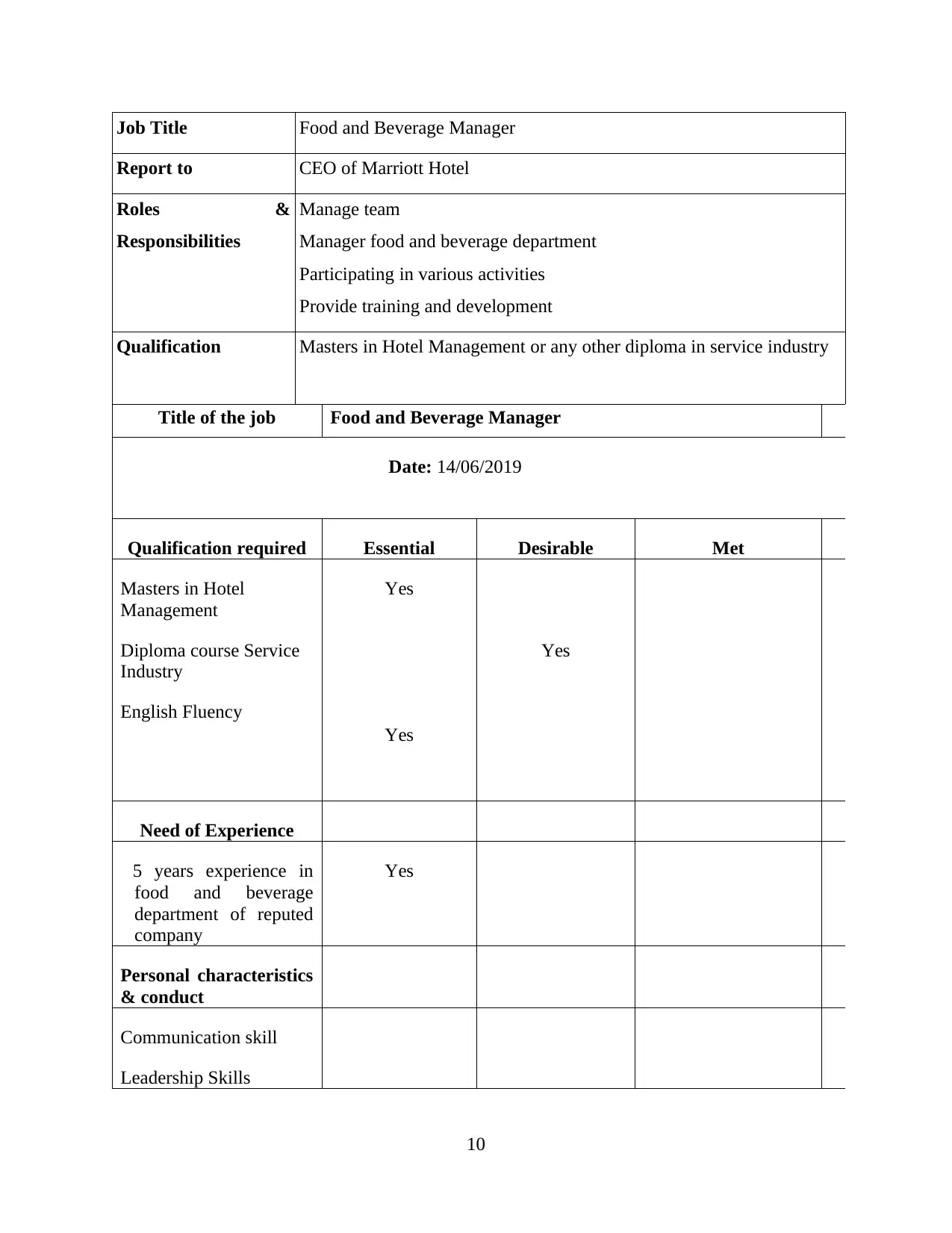
Job Title Food and Beverage Manager
Report to CEO of Marriott Hotel
Roles &
Responsibilities
Manage team
Manager food and beverage department
Participating in various activities
Provide training and development
Qualification Masters in Hotel Management or any other diploma in service industry
Title of the job Food and Beverage Manager
Date: 14/06/2019
Qualification required Essential Desirable Met
Masters in Hotel
Management
Diploma course Service
Industry
English Fluency
Yes
Yes
Yes
Need of Experience
5 years experience in
food and beverage
department of reputed
company
Yes
Personal characteristics
& conduct
Communication skill
Leadership Skills
10
Report to CEO of Marriott Hotel
Roles &
Responsibilities
Manage team
Manager food and beverage department
Participating in various activities
Provide training and development
Qualification Masters in Hotel Management or any other diploma in service industry
Title of the job Food and Beverage Manager
Date: 14/06/2019
Qualification required Essential Desirable Met
Masters in Hotel
Management
Diploma course Service
Industry
English Fluency
Yes
Yes
Yes
Need of Experience
5 years experience in
food and beverage
department of reputed
company
Yes
Personal characteristics
& conduct
Communication skill
Leadership Skills
10
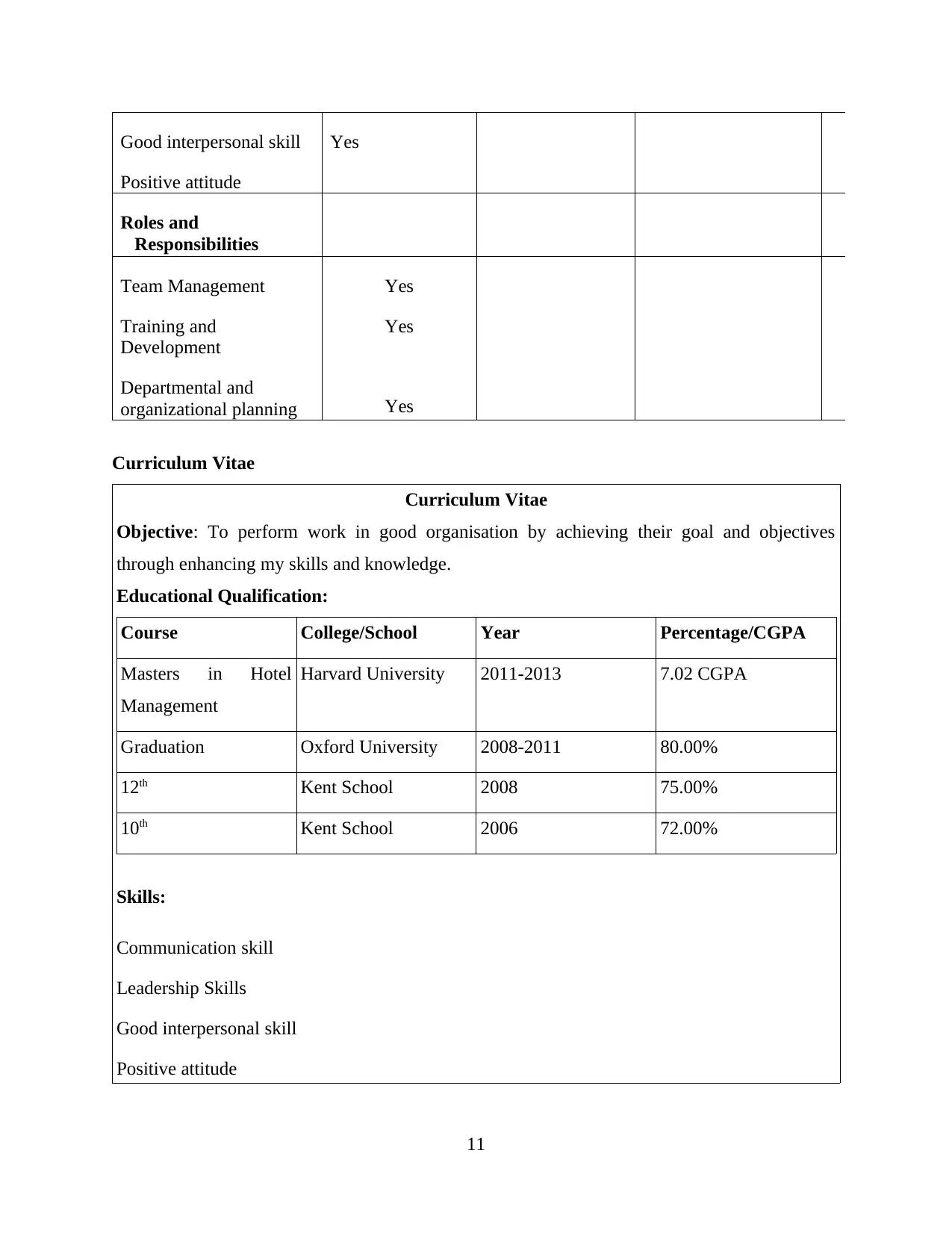
Good interpersonal skill
Positive attitude
Yes
Roles and
Responsibilities
Team Management
Training and
Development
Departmental and
organizational planning
Yes
Yes
Yes
Curriculum Vitae
Curriculum Vitae
Objective: To perform work in good organisation by achieving their goal and objectives
through enhancing my skills and knowledge.
Educational Qualification:
Course College/School Year Percentage/CGPA
Masters in Hotel
Management
Harvard University 2011-2013 7.02 CGPA
Graduation Oxford University 2008-2011 80.00%
12th Kent School 2008 75.00%
10th Kent School 2006 72.00%
Skills:
Communication skill
Leadership Skills
Good interpersonal skill
Positive attitude
11
Positive attitude
Yes
Roles and
Responsibilities
Team Management
Training and
Development
Departmental and
organizational planning
Yes
Yes
Yes
Curriculum Vitae
Curriculum Vitae
Objective: To perform work in good organisation by achieving their goal and objectives
through enhancing my skills and knowledge.
Educational Qualification:
Course College/School Year Percentage/CGPA
Masters in Hotel
Management
Harvard University 2011-2013 7.02 CGPA
Graduation Oxford University 2008-2011 80.00%
12th Kent School 2008 75.00%
10th Kent School 2006 72.00%
Skills:
Communication skill
Leadership Skills
Good interpersonal skill
Positive attitude
11
Paraphrase This Document
Need a fresh take? Get an instant paraphrase of this document with our AI Paraphraser

Job Experience:
Working in Hilton Hotel as food and beverage executive from 2013 to present
Declaration:
I hereby declare that the given information to best of my knowledge.
Interview Question
What are your key role and responsibilities?
Where do you see yourself after five years?
What you want to leave your previous organisation?
Interview Process
This is the procedure which helps to select suitable candidate for mentioned profile. It
carry following step:
First Stage: Recruitment
The candidate can apply for given post through portal or website. Here all candidates get
an opportunity to apply for given job (Hercelinskyj and et. al., 2014).
Second Stage: Selection
The screening is done and shortlisted candidates are chosen for presented job profile.
They have to go through various tests in order to get selection.
Third Stage: Training and Development
This is last phase where interview is conducted for selected candidates. They are given
training and development, orientation programs for knowing their roles and responsibilities in
organisation and made aware about firm environment, vision, mission and others (Johnson and
et. al., 2012).
P7 Strengths and weaknesses of applied interview process
The strengths and weaknesses of applied interview process are:
Interview Process Strengths Weaknesses
First Step: Recruitment The organisation provide
opportunity for all candidates.
The candidate possessing
particular skill and knowledge
can be applied.
12
Working in Hilton Hotel as food and beverage executive from 2013 to present
Declaration:
I hereby declare that the given information to best of my knowledge.
Interview Question
What are your key role and responsibilities?
Where do you see yourself after five years?
What you want to leave your previous organisation?
Interview Process
This is the procedure which helps to select suitable candidate for mentioned profile. It
carry following step:
First Stage: Recruitment
The candidate can apply for given post through portal or website. Here all candidates get
an opportunity to apply for given job (Hercelinskyj and et. al., 2014).
Second Stage: Selection
The screening is done and shortlisted candidates are chosen for presented job profile.
They have to go through various tests in order to get selection.
Third Stage: Training and Development
This is last phase where interview is conducted for selected candidates. They are given
training and development, orientation programs for knowing their roles and responsibilities in
organisation and made aware about firm environment, vision, mission and others (Johnson and
et. al., 2012).
P7 Strengths and weaknesses of applied interview process
The strengths and weaknesses of applied interview process are:
Interview Process Strengths Weaknesses
First Step: Recruitment The organisation provide
opportunity for all candidates.
The candidate possessing
particular skill and knowledge
can be applied.
12
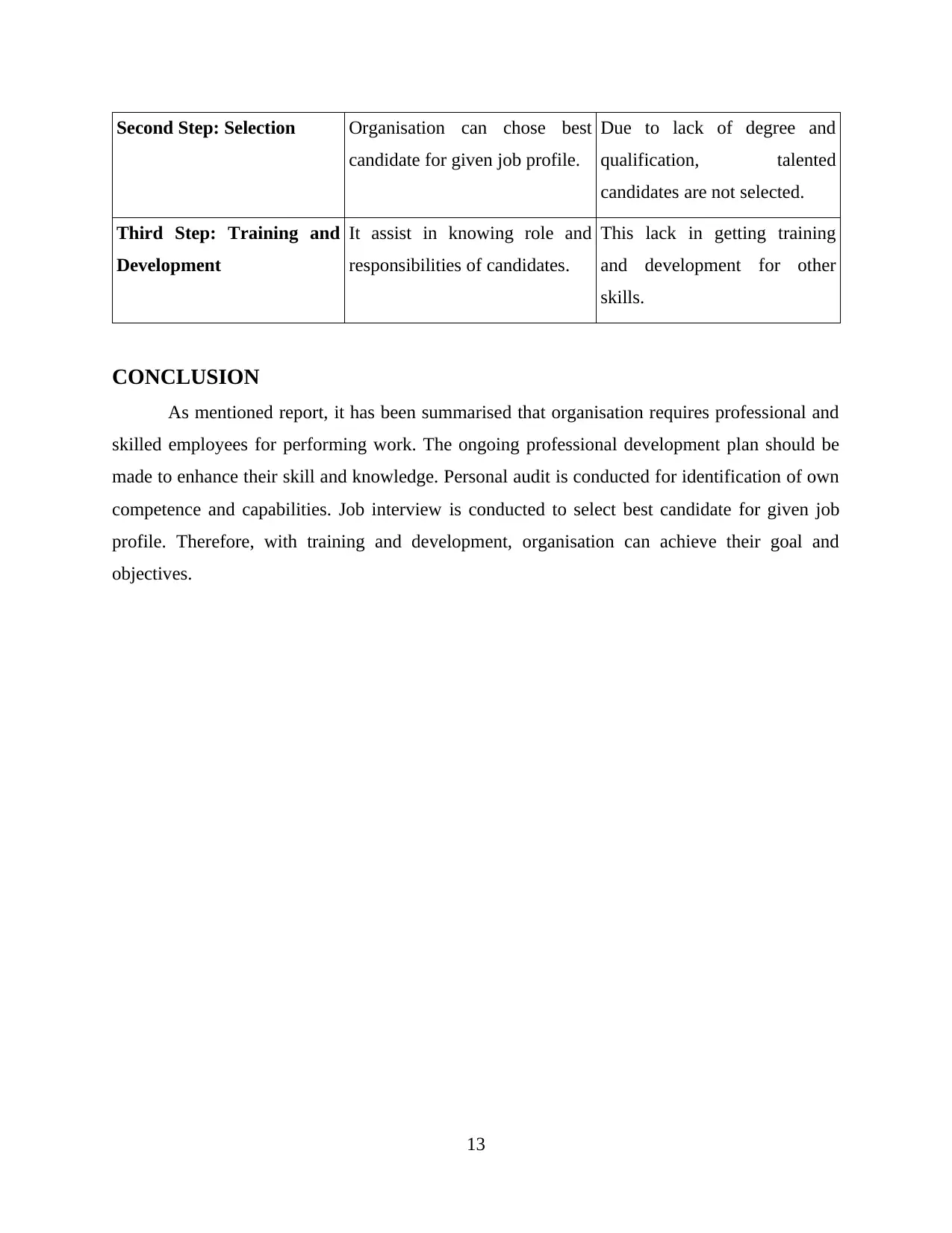
Second Step: Selection Organisation can chose best
candidate for given job profile.
Due to lack of degree and
qualification, talented
candidates are not selected.
Third Step: Training and
Development
It assist in knowing role and
responsibilities of candidates.
This lack in getting training
and development for other
skills.
CONCLUSION
As mentioned report, it has been summarised that organisation requires professional and
skilled employees for performing work. The ongoing professional development plan should be
made to enhance their skill and knowledge. Personal audit is conducted for identification of own
competence and capabilities. Job interview is conducted to select best candidate for given job
profile. Therefore, with training and development, organisation can achieve their goal and
objectives.
13
candidate for given job profile.
Due to lack of degree and
qualification, talented
candidates are not selected.
Third Step: Training and
Development
It assist in knowing role and
responsibilities of candidates.
This lack in getting training
and development for other
skills.
CONCLUSION
As mentioned report, it has been summarised that organisation requires professional and
skilled employees for performing work. The ongoing professional development plan should be
made to enhance their skill and knowledge. Personal audit is conducted for identification of own
competence and capabilities. Job interview is conducted to select best candidate for given job
profile. Therefore, with training and development, organisation can achieve their goal and
objectives.
13

REFERENCES
Books and Journals
Albro, R. ed., 2012. Anthropologists in the securityscape: ethics, practice, and professional
identity. Left Coast Press.
Andrew, N., 2012. Professional identity in nursing: are we there yet?. Nurse Education Today.
32(8). pp.846-849.
Beltman, S., and et. al., 2015. Drawing identity: Beginning pre-service teachers' professional
identities. Issues in Educational Research. 25(3). p.225.
Boyd, P. and Tibke, J., 2012. Being a school-based teacher educator: developing pedagogy and
identity in facilitating work-based higher education in a professional field. Practitioner
Research in Higher Education. 6(2). pp.41-57.
Clark, P. G., 2014. Narrative in interprofessional education and practice: implications for
professional identity, provider–patient communication and teamwork. Journal of
Interprofessional Care. 28(1). pp.34-39.
Clarke, C., and et. al., 2015. Sustaining professional identity in practice following role-emerging
placements: Opportunities and challenges for occupational therapists. British Journal of
Occupational Therapy. 78(1). pp.42-50.
Crigger, N. and Godfrey, N., 2014. From the inside out: A new approach to teaching
professional identity formation and professional ethics. Journal of Professional
Nursing. 30(5). pp.376-382.
Cruess, R. L., and et. al., 2015. A schematic representation of the professional identity formation
and socialization of medical students and residents: a guide for medical educators.
Academic Medicine. 90(6). pp.718-725.
Gitterman, A., 2014. Social work: A profession in search of its identity. Journal of Social Work
Education. 50(4). pp.599-607.
Goldie, J., 2012. The formation of professional identity in medical students: considerations for
educators. Medical teacher. 34(9). pp.e641-e648.
Hercelinskyj, G., and et. al., 2014. Perceptions from the front line: Professional identity in
mental health nursing. International Journal of Mental Health Nursing. 23(1). pp.24-32.
Johnson, M., and et. al., 2012. Professional identity and nursing: contemporary theoretical
developments and future research challenges. International nursing review. 59(4).
pp.562-569.
Oliver, C., 2013. Social workers as boundary spanners: Reframing our professional identity for
interprofessional practice. Social Work Education. 32(6). pp.773-784.
Wald, H. S., 2015. Professional identity (trans) formation in medical education: reflection,
relationship, resilience. Academic Medicine. 90(6). pp.701-706.
Woo, H., Henfield, M. S. and Choi, N., 2014. Developing a unified professional identity in
counseling: A review of the literature. Journal of Counselor Leadership and Advocacy.
1(1). pp.1-15.
Online
CPD Explained. 2019. [Online]. Available through: <https://cpduk.co.uk/explained>.
The Big Five Personality Traits. 2019. [Online]. Available through:
<https://www.verywellmind.com/the-big-five-personality-dimensions-2795422>.
Learning Approaches. 2019. [Online]. Available through:
<https://www.skillsyouneed.com/learn/learning-approaches.html>.
14
Books and Journals
Albro, R. ed., 2012. Anthropologists in the securityscape: ethics, practice, and professional
identity. Left Coast Press.
Andrew, N., 2012. Professional identity in nursing: are we there yet?. Nurse Education Today.
32(8). pp.846-849.
Beltman, S., and et. al., 2015. Drawing identity: Beginning pre-service teachers' professional
identities. Issues in Educational Research. 25(3). p.225.
Boyd, P. and Tibke, J., 2012. Being a school-based teacher educator: developing pedagogy and
identity in facilitating work-based higher education in a professional field. Practitioner
Research in Higher Education. 6(2). pp.41-57.
Clark, P. G., 2014. Narrative in interprofessional education and practice: implications for
professional identity, provider–patient communication and teamwork. Journal of
Interprofessional Care. 28(1). pp.34-39.
Clarke, C., and et. al., 2015. Sustaining professional identity in practice following role-emerging
placements: Opportunities and challenges for occupational therapists. British Journal of
Occupational Therapy. 78(1). pp.42-50.
Crigger, N. and Godfrey, N., 2014. From the inside out: A new approach to teaching
professional identity formation and professional ethics. Journal of Professional
Nursing. 30(5). pp.376-382.
Cruess, R. L., and et. al., 2015. A schematic representation of the professional identity formation
and socialization of medical students and residents: a guide for medical educators.
Academic Medicine. 90(6). pp.718-725.
Gitterman, A., 2014. Social work: A profession in search of its identity. Journal of Social Work
Education. 50(4). pp.599-607.
Goldie, J., 2012. The formation of professional identity in medical students: considerations for
educators. Medical teacher. 34(9). pp.e641-e648.
Hercelinskyj, G., and et. al., 2014. Perceptions from the front line: Professional identity in
mental health nursing. International Journal of Mental Health Nursing. 23(1). pp.24-32.
Johnson, M., and et. al., 2012. Professional identity and nursing: contemporary theoretical
developments and future research challenges. International nursing review. 59(4).
pp.562-569.
Oliver, C., 2013. Social workers as boundary spanners: Reframing our professional identity for
interprofessional practice. Social Work Education. 32(6). pp.773-784.
Wald, H. S., 2015. Professional identity (trans) formation in medical education: reflection,
relationship, resilience. Academic Medicine. 90(6). pp.701-706.
Woo, H., Henfield, M. S. and Choi, N., 2014. Developing a unified professional identity in
counseling: A review of the literature. Journal of Counselor Leadership and Advocacy.
1(1). pp.1-15.
Online
CPD Explained. 2019. [Online]. Available through: <https://cpduk.co.uk/explained>.
The Big Five Personality Traits. 2019. [Online]. Available through:
<https://www.verywellmind.com/the-big-five-personality-dimensions-2795422>.
Learning Approaches. 2019. [Online]. Available through:
<https://www.skillsyouneed.com/learn/learning-approaches.html>.
14
Secure Best Marks with AI Grader
Need help grading? Try our AI Grader for instant feedback on your assignments.

15
1 out of 17
Related Documents
Your All-in-One AI-Powered Toolkit for Academic Success.
+13062052269
info@desklib.com
Available 24*7 on WhatsApp / Email
![[object Object]](/_next/static/media/star-bottom.7253800d.svg)
Unlock your academic potential
© 2024 | Zucol Services PVT LTD | All rights reserved.





